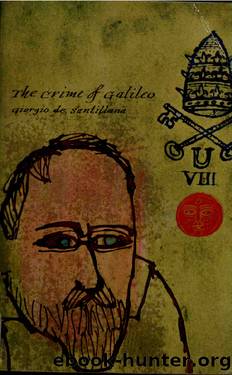Santillana by The Crime of Galileo

Author:The Crime of Galileo [Galileo, The Crime of]
Language: eng
Format: epub
Published: 0101-01-01T00:00:00+00:00
III
He decided to try out the ground. He wrote a long-overdue reply to Francesco Ingoli’s brief of 1616,15 in which, after correcting his opponent’s naïve mistakes in geometry in a good-natured and leisurely way, he took a resolutely Copernican stand: “I maintain further,” he concluded after giving several cogent reasons, “that I know other facts of experience which have been hitherto observed by no one, from which, within the limits of natural and human considerations, the rightness of the Copernican system appears incontrovertible.” He had prefaced the letter, however, with a careful diplomatic statement of submission: he would never say the doctrine was true—far from it—but he wished to prove to the heretics of Germany that, if in Catholic Italy the views of their great countryman had been rejected, it was not from ignorance of their great probability “but from reverence for Holy Scripture and the Fathers and from zeal for our religion and holy faith.” The more valid the proofs, he added, “the clearer the beneficent conclusion that there is no trusting purely human reasoning and that we must rely implicitly on the higher knowledge which alone can bring light to the darkness of our mind.” The chuckle is almost audible. The well-worked-out submission clause hides it impeccably.
There was no question of printing the letter, but it circulated widely, was read by Campoli to the Pope, and raised no objections. Galileo had boldly tested his own interpretation of the papal directive; he was going to discuss heliocentrism not as a mere mathematical supposition but as a physical conclusion which ought to be accepted if only supernatural wisdom did not deny it. The trial balloon, from all indications, had worked well.
He was hoping now to bring the Dialogue to a conclusion in a couple of years, the more so as several parts of the argument had been worked out previously and needed only a recasting. But many circumstances, not the least of them illness, delayed him year after year. There seems to have been a complete intermission to the almost-finished work between 1626 and 1629. This interruption, which changed the whole timing probably to Galileo’s disadvantage, was due, he implied, to his many occupations, mainly engineering consulting work. But there seems to have been also a certain amount of hesitation and discouragement. Cesi and Campoli kept pressing him. “We hear,” writes the latter in 1628, “that your Dialogue is coming along very slowly, and we bewail the loss of such rare treasures. We cannot wait to read at least some small part. Your friends beg of you to disregard the counsels of repose and to follow the urge to glory and our exhortations. . . . Do not defraud the expectations of the world.”
But Galileo knew how carefully he must organize his forces before striking. He was no Bruno or Campanella, to rush into print with generous certainties and uncertain reasons. The “immense design” was proving even more appalling as he faced it at long last, and more difficult to encompass.
Download
This site does not store any files on its server. We only index and link to content provided by other sites. Please contact the content providers to delete copyright contents if any and email us, we'll remove relevant links or contents immediately.
Hit Refresh by Satya Nadella(9126)
When Breath Becomes Air by Paul Kalanithi(8427)
The Girl Without a Voice by Casey Watson(7886)
A Court of Wings and Ruin by Sarah J. Maas(7822)
Do No Harm Stories of Life, Death and Brain Surgery by Henry Marsh(6938)
Shoe Dog by Phil Knight(5257)
The Rules Do Not Apply by Ariel Levy(4957)
A Higher Loyalty: Truth, Lies, and Leadership by James Comey(4954)
Hunger by Roxane Gay(4923)
Tuesdays with Morrie by Mitch Albom(4774)
Everything Happens for a Reason by Kate Bowler(4734)
The Immortal Life of Henrietta Lacks by Rebecca Skloot(4581)
Millionaire: The Philanderer, Gambler, and Duelist Who Invented Modern Finance by Janet Gleeson(4469)
How to Change Your Mind by Michael Pollan(4355)
All Creatures Great and Small by James Herriot(4311)
The Money Culture by Michael Lewis(4198)
Man and His Symbols by Carl Gustav Jung(4131)
Elon Musk by Ashlee Vance(4122)
Tokyo Vice: An American Reporter on the Police Beat in Japan by Jake Adelstein(3988)
